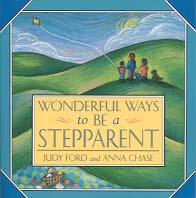|
________________
CM . . . .
Volume VI Number 7 . . . . November 26, 1999
excerpt: Unless you are tuned in to your stepchildren, you will be travelling blind, destined to make many wrong turns. But once you do tune in, you will be amazed what your intuition will begin to show you: Tom is angry and he thinks he's mad at me. If I go give him a hug, he'll feel better and the whole problem will blow over; Samantha needs someone to talk to, she's worried about something she can't tell her parents. Here's where I can finally be of help.Wonderful Ways to be a Stepparent is co-authored by Americans Judy Ford and Anna Chase, who both know about stepparenting through first-hand experience. Judy Ford is a family therapist and best-selling author of several books relating to family relationships while Anna Chase is a freelance writer, stepmother to a son and a daughter. Their book is a neat little paperback with lots of prickly problems examined and possible solutions given. The book's format is such that each topic is contained on two facing pages. A search through the table of contents will narrow down specific stumbling blocks in stepparenting, but the entire book is well worth reading for the help it contains. Blended families, i.e. families with his, hers, and their children, or some combination of this situation, are becoming very common today. Because there are bound to be problems, the authors give excellent suggestions about preventing as many of them as possible, or solving them when they do arise. They also point out that stepparents are the adults who should be in control of themselves even when facing rejection by the children in their care. Since it is impossible for a stepparent to replace entirely the biological parent, it is better, therefore, to seek a different kind of relationship - advisor, companion, confidant - and to be content with that. The three main sections of the book with a small sample of the topics follow:
Even a teenager would find in it ideas to smooth his/her relationship with a stepparent, and, at the same time, gain an insight into the difficulties of that person's position. Highly recommended for stepparents and the children they care for, both natural and stepchildren. Highly recommended. Joan Payzant, a former teacher-librarian, lives in Dartmouth, NS.
To comment on this title or this review, send mail to cm@umanitoba.ca.
Copyright © the Manitoba Library Association.
Reproduction for personal use is permitted only if this copyright notice
is maintained. Any other reproduction is prohibited without
permission.
Published by
TABLE OF CONTENTS FOR THIS ISSUE - November 26, 1999.
AUTHORS |
TITLES |
MEDIA REVIEWS |
PROFILES |
BACK ISSUES |
SEARCH |
CMARCHIVE |
HOME
|
